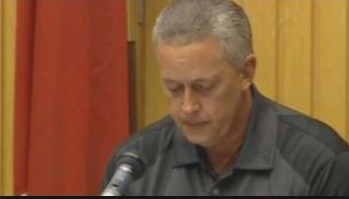Echoes of Impact: How Victim Statements Shape Recovery and Justice
- Marica Phipps Johnson

- Apr 14, 2017
- 7 min read
Updated: Apr 20, 2024

"Victim impact statements are written or oral information from crime victims, in their own words, about how a crime has affected them. All 50 states allow victim impact statements at some phase of the sentencing process." ~The Center for National Crime Victims
The Enduring Influence of Victim Impact Statements
During a recent class in my psychology victimology course, we delved deep into the role and power of victim impact statements. We were tasked with creating a "mock" statement, which led us to study several real-life examples, including a heart-wrenching statement from Gary Christian, father of Channon Christian. His profound grief and the vivid portrayal of his loss during his daughter’s perpetrator's sentencing is a stark reminder of the raw power these statements hold.
This exercise wasn’t just academic for me; it was personal. Having previously navigated this daunting process, I revisited the deep-seated emotions from my own experience, reflecting on how crucial it is for the judiciary to see and feel the human cost of crime. Granting the victim the opportunity to be involved in the judicial process serves as a potent tool for judges and prosecutors. The notion of 'justice is served' can often be ambiguous, as what constitutes justice for a judge may not align with the victim's sense of justice. While it is the judge’s role to apply the law, it is equally important for the victim to convey to the court those impacts and feelings that cannot be learned from evidence alone, but must be felt
You can find Gary Christian's victim impact statement here: http://www.youtube.com/watch?v=5La2QrFrz1s
"Everyone deserves to be heard, in order for changes to be made in law enforcement, courts, and corrections, it is going to take someone that is willing to listen."
The Weight of Words: Reliving the Past through Victim Impact Statements
As a victim of crime, this assignment was not difficult for me since I have written and read one in the courtroom before. However, pulling this letter out again brought back the anxiety and nervousness I felt on the day of my former boyfriend's sentencing. Wednesday, September 16, 2015, is a day that is just as memorable as the day that led me to it. It took virtually two years to get to the sentencing day; the journey between being victimized and being vindicated...was a long road.
Engagement and Justice: The Dual Edges of Impact Statements
Victim impact statements transcend their role as mere narrative tools; they are vital instruments of justice and healing. Acting as a bridge between sterile legalities and raw human emotions, they provide judges and prosecutors with a deeper insight beyond the confines of case files. For many victims, crafting these statements is a rare opportunity to indirectly confront their perpetrators, offering a powerful sense of personal reclamation in an often impersonal judicial process.
Victim vs. Survivor
The terms 'victim' and 'survivor' are often used interchangeably, yet they represent different stages in the healing journey. Whether one is labeled a victim or a survivor largely depends on their personal progression toward healing. The transformation from victim to survivor is a path I know well—fraught with unbearable pain and challenges I wouldn't wish on anyone. Even now, as a survivor, the journey continues. There is no true 'finish line' in the process of overcoming trauma.
"Once you have been victimized by any form of violence, you are and never will be the same."
Small Voice: Big Impact
Violence leaves a profound impact on families, particularly on children whose voices may get lost in the chaos. It's often challenging for them to express their emotions clearly, yet acknowledging their trauma is crucial, regardless of whether they were directly or indirectly affected. My three children, though not physically injured, endured emotional scars just as deep as my own. Their daily lives and routines were upended—peering anxiously through windows, suffering from sleepless nights, and feeling unsafe in their sanctuary, our home. All had the chance to write their impact statements, which were presented to the judge. Their honesty and bravery in expressing their pain was profound. The process of writing an impact statement is transformative. I witnessed this first-hand with my children, particularly my then 8-year-old daughter, Amaya. She wrote and bravely read her statement in court, standing up not just to her indirect abuser but to the fear and chaos that had overshadowed her young life. Her courage was a profound moment of triumph not just for her, but for our entire family, reminding us of the resilience and strength that often lies untapped in the face of adversity.

8-year-old girl reads victim impact statement in court after her mother was beaten.

Personal Reflection: The Day of Reckoning
On September 16, 2015, at 9 AM, I entered the courtroom not just as a case number, but as a survivor—surrounded by the unwavering support of my family and friends. That morning, I was forced to revisit those harrowing days I had fought so hard to move past—the days filled with fear, brokenness, solitude, and shame; the days I battled to regain my voice and my self-assurance. This was the moment I had been waiting for to stand before the judge—and crucially, in front of my abuser—to narrate the deep, dark journey my family and I had been forced down by the crime. I needed the judge to see the real me: the pain in my eyes, the tremor in my voice, and the resolve in my spirit.
I was there not only as a victim but as a daughter, a mother, demanding to be seen and heard.
As I walked back to my seat after delivering my statement, an overwhelming sense of release enveloped me. I could finally breathe again. The weight I had carried for so long lifted, and I felt the shackles of my trauma break away. I was free. It was a profound freedom that came not from the sentence to be handed down—six years—but from having my voice resonate in that courtroom. The impact was immediate; one prosecutor approached me afterward, sharing that in his twenty years of service, he had never heard a victim impact statement as compelling as mine. This acknowledgment not only affirmed the strength it took to speak out but also underscored the transformative power of such statements. It was then that I truly understood the power of our voices, no matter how big or small they might seem. September 16, 2015, remains a significant date in my life—the day I stood in court, not just as a survivor of domestic violence, but as an advocate for myself and my family. The courtroom became a place of liberation. As I read my statement, the emotional shackles began to loosen. This moment wasn’t about the sentence that would be handed down; it was about being heard, truly and deeply heard. The affirmations from the prosecutors afterward only underscored the impact my words had made.
Click here for a link to view the courtroom video and news media footage.

Domestic Violence Survivor, Marica Phipps reading her victim impact statement during the sentencing of her ex-boyfriend.
Comprehensive Guide and Sample Letter
For those looking for more detailed guidance in writing an impact statement, I have compiled a comprehensive guide complete with a sample victim impact statement. This guide is designed to support you through the process of articulating your experiences and emotions in a structured and impactful way.
To access the guide and sample letter, click below to download.
This resource aims to provide you with the tools you need to effectively communicate the depth of your experiences and the consequences of the crime, helping you navigate this crucial part of the judicial process.
Further Reading and Resources:
For those looking for more detailed guidance or additional perspectives on victim impact statements, you might find these posts helpful:
Each post offers unique insights and further elaborations on the importance and impact of these statements in the judicial process. For a more vivid illustration of these moments, you can view the courtroom video from the sentencing where my daughter and I read our statements. This link is available in the previous posts linked above.
If you are preparing your victim impact statement, know that your voice matters. The journey from victim to survivor is arduous and ongoing, but every step you take in reclaiming your story is a stride toward healing. For guidance and support, please visit the National Center for Victims of Crime or consult Victim Support Services for assistance in crafting your statement. Our comprehensive is also listed below and on our resources page.
National Center for Victims of Crime - Provides resources and advocacy for a wide range of crimes. Visit their website for information on victim impact statements or Victim Support Services to get help and suggestions in writing an impact statement.
RAINN (Rape, Abuse & Incest National Network) - Offers support for sexual assault survivors, including help in writing victim impact statements. Learn more on their website.
Victim Support Services - Practical advice and support on writing victim impact statements and navigating the emotional challenges of the process. Click here for assistance.
Battered Not Broken, Inc.- Detailed guidance in writing an impact statement and a sample letter can be found on our resource page or by clicking below to download.
Recent Studies & Statistics:
Research published by the Justice Department has shown that victims who participate in the sentencing phase through impact statements feel more satisfied with the legal process.
Effect on Sentencing Outcomes: A study by researchers at the University of Leicester found that victim impact statements can influence the perception of the offender's culpability among judges and jurors, potentially affecting sentencing outcomes. The research suggests that when judges and jurors are exposed to detailed accounts of the emotional and psychological damage suffered by victims, there tends to be a higher likelihood of imposing stricter sentences. This emphasizes the role of these statements in ensuring that the impact on the victim is fully considered in the judicial process.
Impact on Victim Healing: Research published in the "Psychology of Violence" journal indicates that victims who deliver impact statements often report a greater sense of closure and are less likely to experience post-traumatic stress symptoms after participating in the sentencing phase of a trial. The study highlights that the act of verbalizing the impact of the crime provides victims a sense of personal agency and empowerment, which are critical components in the psychological healing process.
Call to Action:
I encourage you to share your own experiences with writing and delivering victim impact statements. By sharing our stories, we not only heal ourselves but also empower others facing similar challenges. If you're comfortable, please share your thoughts and stories in the comments below or on social media to help foster a supportive community. Together, we can shine a light on the importance of being heard and acknowledged in the judicial process.
Remember, the power of a victim impact statement lies not just in the words spoken or written but in the courage to share them. Every voice matters, and every story can make a difference in reshaping our approach to justice and healing.







Comments